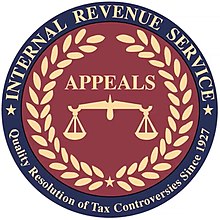When submitting an Offer In Compromise (OIC) to settle a tax debt, hopefully the process is one that is smooth and successful. However, this is not always the case. Many times there is push back from the IRS to adjust the amount they are willing to settle for or in some cases a flat out rejection of the OIC. In this blog, we will discuss the options you still have for appealing your OIC after it has been rejected.
Time Frame To Appeal
Under Treasury Regulation (Treas. Reg.) § 301.7122-1(f)(5)(i) The taxpayer may administratively appeal a rejection of an offer to compromise to the IRS Office of Appeals (Appeals) if, within the 30-day period commencing the day after the date on the letter of rejection, the taxpayer requests such an administrative review in the manner provided by the Secretary.

Whatever the reason for appealing the rejected OIC, the appeals process can begin after receiving the OIC denial letter from the IRS. Once this letter is received you have 30 days to submit form 13711, Request for Appeal of Offer In Compromise. The alternative option is to write a formal letter that includes these specific items:
- Your name, address, SSN, and phone number
- A brief statement explaining that you would like to appeal the rejected OIC
- A copy of the rejection letter
- The tax periods of years that the OIC covered
- A list of the items that you disagree with and a reason why you disagree
- Additional information you wish the appeals office to consider
- Information supporting your position on the items you disagree with
- Include the law or authority that you are relying on to take your position
- A signature from yourself, stating that the information provided is true under penalty of perjury
Reasons For Appealing
There are many reasons for appealing the IRS’s decision to deny the OIC but, before proceeding with the appeals process there are certain things to consider. First and foremost you’ll need to determine exactly what you are appealing (other than of course the denial).
Perhaps you disagree with the counter offer the IRS provided for settling the tax debt. The big question to consider in this scenario is: Does the amount of the adjustment warrant going through the appeals process? The reason for answering this question is because the appeals process extends the amount of time it will take to ultimately come to an acceptance or denial of the OIC. There is also no guarantee that just because an appeal of the adjustment was made that it will change the initial determination.

However, if the the adjustment is significant (and you cannot pay) or the IRS simply rejects the OIC, then appealing the OIC may be the next step. Of course, it’s important to also consider whether the reason for appealing is a valid one. The following questions may help you determine whether to move forward with appealing a rejected OIC :
- Has the IRS made a decision based on an incorrect interpretation of the law?
- Has the IRS improperly applied the law due to a misunderstanding of the facts?
- Is the IRS taking inappropriate collection action against you or you disagree with the decision to reject your OIC?
Most of the time an appeal is pursued when a taxpayer and the IRS have a differing opinion on the taxpayer’s income, expenses, and/or accessible equity in assets (which are used to determine the offer amount). If you determine that an appeal is appropriate, you then must be able to provide substantiating evidence to support your position.
What Happens After You Send In The Appeal
Upon determining that you indeed want to proceed with appealing the rejection of the OIC and have completed form 13711 or the formal written letter, you’ll then need to mail the form or letter to the address provided on the rejection letter. This will be sent to the IRS collection department for review of the appeal to make sure everything was properly included. For a list of what will be reviewed see Internal Revenue Manual (IRM) § 5.8.7.7.5. Just to clarify, the initial review by the IRS Collections Dept. is only to make sure the appeal was properly submitted and not to review it’s content.

After the appeal has been reviewed, it will be forwarded to the IRS Office of Appeals where the information actually included in the appeal will be reviewed. Generally this review process will take a few months to complete but, once completed, you will be contacted with a day and time to speak with the IRS Office of Appeals assigned Settlement Officer. This is basically the time for you to clarify anything that the Office of Appeals may be having trouble understanding and to make your case as to why the OIC should be accepted. Finally, the Office of Appeals will make a final determination as to whether the OIC should be accepted or not, which you will be notified of through the mail.
NOTE: If you initially submitted your OIC through a Collection Due Process Hearing (CDP Hearing), the time frames and procedures may differ from submitting an OIC directly to the IRS. This blog does not cover the specifics but in these cases it is important to seek legal representation to preserve your rights (including your right to petition the United States Tax Court).
Conclusion
The IRS employees reviewing OICs do make mistakes and appealing your OIC may be the best way to get it accepted. However, appealing the rejection of an OIC is not an easy task, especially when you must make sure the information you are submitting is relevant and accurate, which will avoid delays and improve your chances of success. If you are uncertain about how the IRS treated your OIC, it is important to seek legal representation quickly to determine if your OIC can be saved.
Related Articles
